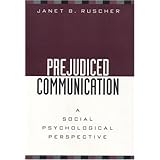
Average Reviews:

(More customer reviews)I am extremely intrigued by the depths of the subject that Dr. Ruscher writes about on the topic from a systemic perspective to a micro-level of communication. I really love the break down of the materials presented, and the social-psychological implications by way of speech and sharing of information that allows for the transmission and transgression of stereotypes in subtle ways.
I highly recommend this book for anyone interested in wanting to explore more aspects of implicit and explicit messages behind communication patterns as a way to increase social consciousness and self-awareness in challenging psychological preconceptions in patterns of behavior.
I look forward to adding this book to my collections. I am glad I bumped into it!
Click Here to see more reviews about: Prejudiced Communication: A Social Psychological Perspective
Prejudiced communication is everywhere. Sexist jokes are transmitted over the Internet, coworkers tell outrageous stories about cross-cultural interactions, and children observe their parents' disgusted facial expressions as a target of prejudice passes along the street. What functions do these forms of communication serve for individuals, groups, and entire cultures? How do they contribute to the perpetuation of discrimination and status differences based on race, ethnicity, gender, sexual orientation, or other stigmatized attributes? And what can be done to reduce prejudiced communication and mitigate its harmful effects? This volume provides a comprehensive examination of these and other questions of critical importance for today's society. Bringing together current theory, empirical research, and real-life examples, it is essential reading for scholars and students in a range of disciplines.The book first defines key terms and introduces several functions served by prejudiced communication, including the protection of established social hierarchies and the maintenance of "cognitive shortcuts." It explores how language reflects categorizations of ingroups and outgroups, and how shared stereotypes are encoded and transmitted. Subsequent chapters address ways that prejudice is subtly or blatantly communicated in interpersonal interactions, including patronizing and controlling speech, discriminatory nonverbal behavior, and disdain for nonstandard accents or dialects. Next, the book examines the larger cultural context, discussing such topics as skewed portrayals in the news media, entertainment, and advertising; hostile humor; and continued legal tolerance of hate speech. Featured throughout are thought-provoking examples drawn from the classroom, the workplace, and other everyday situations. A concluding chapter summarizes major themes of the book and points toward empirical and theoretical gaps that invite further investigation.Grounded in a social psychological perspective, the book also incorporates ideas and findings from communication, sociology, and related fields. It is an informative resource for anyone interested in prejudice and stereotyping, and an indispensable text for advanced undergraduate and graduate-level courses.
Click here for more information about Prejudiced Communication: A Social Psychological Perspective

No comments:
Post a Comment